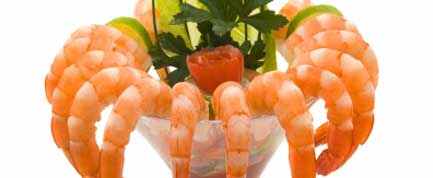Powerful Ideas: Shrimp Cocktail Helps Make Biodiesel

Get the world’s most fascinating discoveries delivered straight to your inbox.
You are now subscribed
Your newsletter sign-up was successful
Want to add more newsletters?

Delivered Daily
Daily Newsletter
Sign up for the latest discoveries, groundbreaking research and fascinating breakthroughs that impact you and the wider world direct to your inbox.

Once a week
Life's Little Mysteries
Feed your curiosity with an exclusive mystery every week, solved with science and delivered direct to your inbox before it's seen anywhere else.

Once a week
How It Works
Sign up to our free science & technology newsletter for your weekly fix of fascinating articles, quick quizzes, amazing images, and more

Delivered daily
Space.com Newsletter
Breaking space news, the latest updates on rocket launches, skywatching events and more!

Once a month
Watch This Space
Sign up to our monthly entertainment newsletter to keep up with all our coverage of the latest sci-fi and space movies, tv shows, games and books.

Once a week
Night Sky This Week
Discover this week's must-see night sky events, moon phases, and stunning astrophotos. Sign up for our skywatching newsletter and explore the universe with us!
Join the club
Get full access to premium articles, exclusive features and a growing list of member rewards.
Editor's Note: This occasional series looks at powerful ideas — some existing, some futuristic — for fueling and electrifying modern life.
Shrimp cocktails could help out fuel tanks, scientists now reveal.
As concerns over global warming and dwindling fossil fuel reserves increase worldwide, more and more interest is growing in renewable fuels such as biodiesel to fill energy demands. However, biodiesel production techniques require catalysts to speed up the chemical reactions that convert soybean, canola, and other plant oils into diesel fuel, and so far catalysts both cannot be reused and must be neutralized with large amounts of water, leaving behind large amounts of polluted wastewater.
Now scientists in China have developed a new catalyst made from shrimp shells that could transform biodiesel production into a faster, cheaper and more environmentally friendly process.
The researchers at Hua Zhong Agriculture University in Wuhan, China, and their colleagues first heated shrimp shells for hours, transforming it into a highly porous framework material. They next loaded its extensive surface area with potassium fluoride, making it catalytic.
In lab tests, the cheap, biodegradable shrimp shell catalyst converted canola oil to biodiesel faster and more efficiently than some conventional catalysts, demonstrating 89 percent conversion in three hours.
The new catalyst also can be reused and the manufacturing process led to less pollution and waste, the scientists note.
Get the world’s most fascinating discoveries delivered straight to your inbox.
"I find it very exciting to see scientists looking outside the box to continue research in energy development," said chemist Brian Trewyn at Iowa State University in Ames, who did not participate in this study. Still, he noted that industrializing shrimp shell catalysts would prove challenging.
The scientists are scheduled to detail their findings in the August 20 issue of the journals Energy & Fuels.

 Live Science Plus
Live Science Plus










